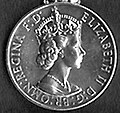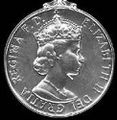Criteria
The Police Long Service and Good Conduct Medal was instituted under Royal Warrant by King George VI in June 1951 and is awarded as a mark of the Sovereign's appreciation of long and meritorious service rendered by members of the Police Forces of the United Kingdom. [3] For an officer to become eligible for this award the Chief Constable must make a recommendation to the Home Secretary, and in doing so, is required to certify the following:
- That an officer has been a serving member of a Police Force.
- That the officer has served efficiently for the qualifying period.
- That the officer's character has been very good.
Length of service
The initial award criterion was 22 years' service as a full-time regular police officer within any Constabulary. [3]
Later, Long Service and Good Conduct Medals were introduced for the Fire Brigade and Ambulance Service, both awarded for 20 years’ service. [6] A national campaign to award the police medal after 20 years, and so bring it in line with the other emergency services, was started by Warwickshire Police Officer Kenneth Fowler, supported by Chief Officers, the Police Federations and Members of Parliament. [7] [4] On 19 January 2010, Queen Elizabeth II amended the medal's royal warrant to make the qualifying period of service 20 years. [1]
Clasps
In March 2022, the Royal Warrant was updated by Queen Elizabeth II to grant clasps to officers who completed a further 10 and 20 years of long service post award of the medal. [8] This change reflected the longer service of Police Officers following pension changes and sought to recognise their extended service. [9] The two clasps are in cupronickel, and bear the inscription below:
- 'Long Service, 30 Years'
- 'Long Service, 40 Years'
This page is based on this
Wikipedia article Text is available under the
CC BY-SA 4.0 license; additional terms may apply.
Images, videos and audio are available under their respective licenses.




